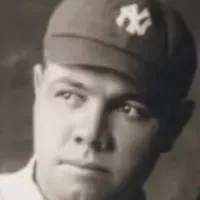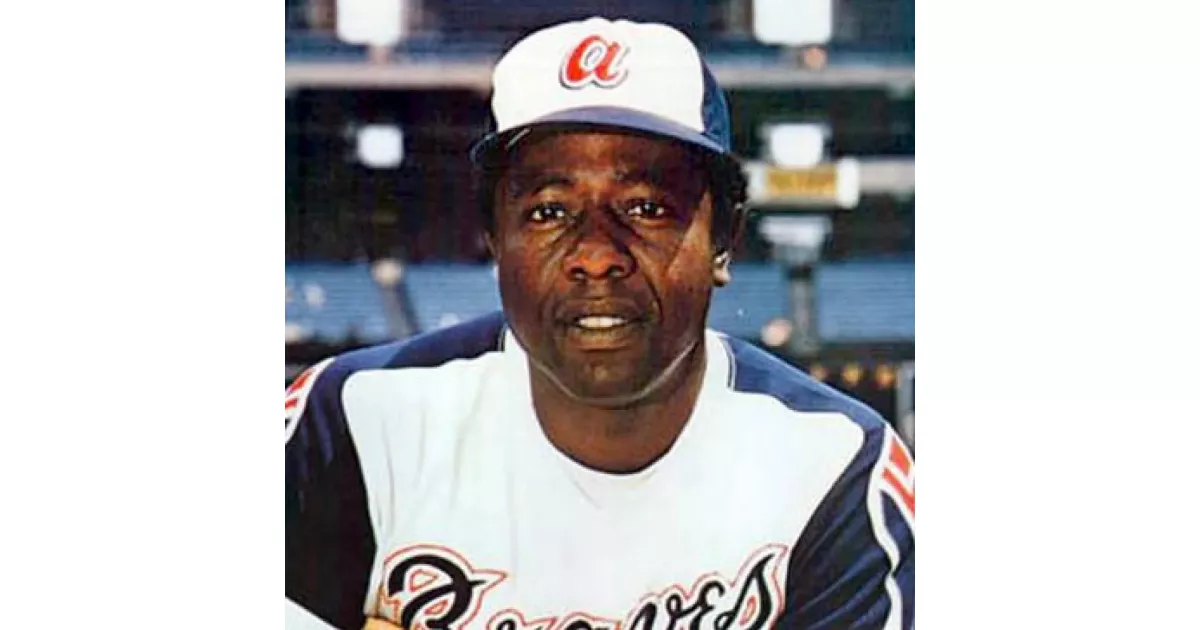Hank Aaron, nicknamed "Hammerin' Hank," was a legendary baseball right fielder who played 23 seasons in MLB (1954-1976). Primarily with the Milwaukee/Atlanta Braves, he later played for the Milwaukee Brewers. Widely regarded as one of baseball's greatest, Aaron held numerous career power-hitting records upon retirement. Most notably, he surpassed Babe Ruth's career home run record, holding the title for 33 years with 755 home runs until Barry Bonds broke the record in 2007. He consistently hit 24+ home runs annually from 1955-1973 and was one of two players to hit 30+ home runs in at least 15 seasons.
February 5, 1934: Henry Louis Aaron Born
On February 5, 1934, Henry Louis Aaron, later nicknamed "Hammer" or "Hammerin' Hank", was born. He would become one of the greatest baseball players in history.
1936: Ty Cobb receives 98.2% of votes in Hall of Fame election.
In the inaugural 1936 Hall of Fame election, Ty Cobb received votes on 98.2% of the ballots.
1949: Tryout with the Brooklyn Dodgers
In 1949, at the age of 15, Hank Aaron had his first tryout with an MLB franchise, the Brooklyn Dodgers; however, he did not make the team.
November 20, 1951: Signed with the Indianapolis Clowns
On November 20, 1951, baseball scout Ed Scott signed Hank Aaron to a contract on behalf of the Indianapolis Clowns of the Negro American League, where he played for three months.
June 12, 1952: Signed with Braves Scout Dewey Griggs
On June 12, 1952, Hank Aaron signed with Braves' scout Dewey Griggs after the Braves purchased Aaron's contract from the Clowns for $10,000.
1952: Assigned to Eau Claire Bears and Named Rookie of the Year
In 1952, Hank Aaron was assigned to the Eau Claire Bears, the Braves' Northern League Class-C farm team. By the end of the season, he was named the unanimous choice for Rookie of the Year.
1953: Won South Atlantic League Championship and MVP Award
In 1953, Hank Aaron helped the Jacksonville Braves win the South Atlantic League championship. He also won the league's Most Valuable Player Award.
1953: Marriage to Barbara Lucas
In 1953, Hank Aaron married Barbara Lucas, with whom he had five children: Gary, Lary, Dorinda, Gaile, and Hank Jr.
1953: Winter League in Puerto Rico
In 1953, Hank Aaron spent the winter playing in Puerto Rico, where Mickey Owen helped him with his batting stance and transition from second base to the outfield.
March 13, 1954: Bobby Thomson Fractured Ankle
On March 13, 1954, Milwaukee Braves left fielder Bobby Thomson fractured his ankle while sliding into second base during a spring training game.
1955: Named to NL All-Star Roster
In 1955, Hank Aaron was named to the NL All-Star roster for the first time, marking the first of a record 21 All-Star selections and first of a record 25 All-Star Game appearances.
1956: Captured First NL Batting Title
In 1956, Hank Aaron hit .328 and captured the first of two NL batting titles. He was also named The Sporting News NL Player of the Year.
December 15, 1957: Birth of Twins
On December 15, 1957, Hank Aaron's wife Barbara gave birth to twins, two days later, one of the children died.
1957: Aaron participates in the World Series
In 1957, Hank Aaron participated in the World Series, contributing to the Braves' performance in the championship series.
1957: Won NL MVP and World Series
In 1957, Hank Aaron won the NL Most Valuable Player (MVP) Award, and the Milwaukee Braves won the World Series.
1958: Led Braves to Another Pennant
In 1958, Hank Aaron hit .326 with 30 home runs and 95 RBI in 153 games. He led the Braves to another pennant.
1958: Wife Noted Aaron's Interests
In 1958, Hank Aaron's wife, Barbara Lucas, noted that during the off-season he liked "to sit and watch those shooting westerns". He also enjoyed cooking and fishing.
June 21, 1959: Hit Three Home Runs in a Game
On June 21, 1959, against the San Francisco Giants, Hank Aaron hit three two-run home runs. It was the only time in his career that he hit three home runs in a game.
1959: Start of five consecutive seasons with 100+ RBIs
In 1959, Aaron began a streak of five consecutive seasons with 100 or more RBIs, highlighting his consistent performance and contribution to the team.
1959: Conversion to Catholicism
In 1959, at the age of 25, Hank Aaron, along with his family, converted to Catholicism, influenced by the birth of their first child and a friendship with a priest.
1963: Nearly Won Triple Crown
In 1963, Hank Aaron nearly won the triple crown, leading the league with 44 home runs and 130 RBI and finishing third in batting average (.319).
May 10, 1967: Hit Inside-The-Park Home Run
On May 10, 1967, Hank Aaron hit an inside-the-park home run against Jim Bunning in Philadelphia, marking the only one of his career.
July 14, 1968: Hit 500th Career Home Run
On July 14, 1968, Hank Aaron hit his 500th career home run against Mike McCormick of the San Francisco Giants.
1968: Hit 500th Career Home Run
In 1968, Hank Aaron was the first Atlanta Braves player to hit his 500th career home run.
July 31, 1969: Passed Mickey Mantle on Career Home Run List
On July 31, 1969, Hank Aaron hit his 537th home run, passing Mickey Mantle's total, moving Aaron into third place on the career home run list.
1969: Aaron participates in the NLCS
In 1969, Hank Aaron participated in the National League Championship Series (NLCS), contributing to the Braves' performance in the series.
1970: Reached 3,000 Career Hits
In 1970, Hank Aaron was the first Atlanta Brave to reach 3,000 career hits.
1970: Collected 3,000th Hit
In 1970, on May 17, Hank Aaron collected his 3,000th hit in a game against the Cincinnati Reds. Aaron also established the record for most seasons with thirty or more home runs in the National League.
April 27, 1971: Hit 600th Career Home Run
On April 27, 1971, Hank Aaron hit his 600th career home run, becoming the third major league player ever to reach the milestone.
1971: Divorce from Barbara Lucas
In 1971, Hank Aaron divorced Barbara Lucas, ending their marriage of several years during which they had five children together.
1972: Broke Stan Musial's Record
During the strike-shortened season of 1972, Hank Aaron tied and then surpassed Willie Mays for second place on the career home run list. Aaron also drove in the 2,000th run of his career and hit a home run in the first All-Star game played in Atlanta. As the year came to a close, Aaron broke Stan Musial's major-league record for total bases (6,134).
August 1973: Public Support and Recognition
In August 1973, Hank Aaron received an outpouring of public support against bigotry, exemplified by Charles Schulz's Peanuts comic strip addressing hate mail. Babe Ruth's widow, Claire, also denounced the racism and supported Aaron's pursuit of the home run record.
September 29, 1973: Aaron hits home run number 713
On September 29, 1973, Hank Aaron hit his 713th career home run, leaving him one short of Babe Ruth's record with one game remaining in the season.
November 13, 1973: Marriage to Billye Suber Williams
On November 13, 1973, Hank Aaron married Billye Suber Williams, starting a new chapter in his personal life.
1973: Plaque from U.S. Postal Service
At the end of the 1973 season, Hank Aaron was honored with a plaque from the U.S. Postal Service for receiving more mail (930,000 pieces) than any person excluding politicians, showcasing the widespread attention and support surrounding his pursuit of the home run record.
1973: Hate Mail and Death Threats
During the 1973-1974 offseason, Hank Aaron was subjected to death threats and hate mail due to his pursuit of Babe Ruth's home run record. This harassment also extended to journalists providing positive coverage of Aaron.
1973: Aaron ends the season one home run short of the record.
In 1973, Aaron ended the season one home run short of Babe Ruth's record, after hitting his 713th home run on September 29, 1973, and failing to tie the record in his final game against the Houston Astros.
1973: Chasing Babe Ruth's Record
In 1973, Hank Aaron's pursuit of Babe Ruth's career home run record intensified, drawing increased media attention and excitement. Despite downplaying the chase himself, Aaron received thousands of letters weekly, including hate mail, requiring assistance from a Braves secretary to manage the volume of correspondence.
April 4, 1974: Aaron Ties Babe Ruth's Record
On April 4, 1974, in his first at-bat of the season against the Cincinnati Reds, Hank Aaron tied Babe Ruth's home run record with his first swing off pitcher Jack Billingham.
April 8, 1974: Aaron Hits Home Run 715
On April 8, 1974, Hank Aaron hit his 715th home run against the Los Angeles Dodgers, surpassing Babe Ruth's record in front of 53,775 fans in Atlanta and a national TV audience, marking a historic moment in baseball.
October 2, 1974: Aaron's Last At-Bat as a Brave
On October 2, 1974, Hank Aaron hit his 733rd home run in his final at-bat as a player for the Atlanta Braves. Aaron then expressed a willingness to return to baseball for another year and an interest in a general manager position.
1974: Aaron fears he won't live to see the 1974 season.
After his final game in 1973, Aaron expressed his fear that he might not live to see the 1974 season, highlighting the intense pressure and threats he faced during his pursuit of Babe Ruth's home run record.
1974: Hate Mail and Death Threats
During the 1973-1974 offseason, Hank Aaron was subjected to death threats and hate mail due to his pursuit of Babe Ruth's home run record. This harassment also extended to journalists providing positive coverage of Aaron.
1974: Aaron's statement on breaking the home run record
In 1974, after breaking the home run record, Aaron stated that the achievement should inspire others to chase their own dreams, emphasizing the importance of perseverance and aspiration.
May 1, 1975: Aaron Breaks All-Time RBI Record
On May 1, 1975, Hank Aaron surpassed Babe Ruth's all-time RBI record of 2,213.
July 20, 1976: Aaron hits his 755th and final home run
On July 20, 1976, Hank Aaron hit his 755th and final career home run at Milwaukee County Stadium off Dick Drago of the California Angels.
1976: Aaron rejoins the Braves as an executive
After the 1976 season, Hank Aaron rejoined the Braves organization as an executive, marking the beginning of his post-playing career.
1976: Aaron Awarded Spingarn Medal
In 1976, Hank Aaron was awarded the Spingarn Medal from the NAACP.
1977: Aaron Receives Golden Plate Award
In 1977, Hank Aaron received the American Academy of Achievement's Golden Plate Award.
December 1980: Aaron Becomes Senior Vice President for the Braves
In December 1980, Hank Aaron was appointed as the senior vice president and assistant to the president of the Atlanta Braves.
August 1, 1982: Induction into the Baseball Hall of Fame
On August 1, 1982, Hank Aaron was inducted into the Baseball Hall of Fame, receiving votes on 97.8 percent of the ballots.
1982: Hank Aaron Inducted into Baseball Hall of Fame
In 1982, Hank Aaron was inducted into the Baseball Hall of Fame during his first year of eligibility.
1982: Inducted into the National Baseball Hall of Fame
In 1982, Hank Aaron was inducted into the National Baseball Hall of Fame in his first year of eligibility.
1986: Guest Appearance on Crazy Like a Fox
In 1986, Hank Aaron made a guest appearance in an episode of the television show "Crazy Like a Fox", titled "Just Another Fox in the Crowd".
1988: Aaron Inducted into Wisconsin Athletic Hall of Fame
In 1988, Hank Aaron was inducted into the Wisconsin Athletic Hall of Fame for his time spent on the Eau Claire Bears, Milwaukee Braves, and Milwaukee Brewers.
1990: Publication of I Had A Hammer
In 1990, Hank Aaron's autobiography, "I Had A Hammer", co-written with Lonnie Wheeler, was published and became a finalist for the Casey Award, offering insights into his life and career.
1991: Aaron credits Fr. Michael Sablica with helping him grow.
In a 1991 interview, Aaron credited Fr. Michael Sablica with helping him grow as a person in the 1950s, influencing his personal development and encouraging him to speak out about causes he believed in.
1994: Establishment of Chasing the Dream Foundation
In 1994, Hank Aaron and his wife established the Chasing the Dream Foundation, awarding the Hank Aaron Chasing The Dream Scholarship to members of the Boys & Girls Clubs of America.
April 1997: Hank Aaron Stadium Constructed in Mobile, Alabama
In April 1997, a new baseball facility for the AA Mobile Bay Bears was constructed in Hank Aaron's hometown of Mobile, Alabama, and named Hank Aaron Stadium.
February 5, 1999: Major League Baseball Announces Hank Aaron Award
On February 5, 1999, at his 65th birthday celebration, Major League Baseball announced the introduction of the Hank Aaron Award, honoring the best overall offensive performer in the American and National League.
1999: Hank Aaron Award Introduced and All-Century Team Selection
In 1999, MLB introduced the Hank Aaron Award to recognize the top offensive players in each league. In that same year, he was one of 30 baseball players elected to the Major League Baseball All-Century Team.
1999: Major League Baseball Creates Hank Aaron Award
In 1999, Major League Baseball established the Hank Aaron Award to commemorate the 25th anniversary of Aaron surpassing Babe Ruth's home run record and to honor Aaron's contributions to baseball. The award is given annually to the most effective hitters in each league.
June 2000: Tufts University Awards Honorary Degree to Aaron
In June 2000, Tufts University awarded Hank Aaron an honorary Doctor of Public Service degree.
July 2000: Aaron Throws First Pitch at MLB All-Star Game
In July 2000, Hank Aaron threw out the ceremonial first pitch at the Major League Baseball All-Star Game, played at Turner Field.
January 8, 2001: Aaron Presented with Presidential Citizens Medal
On January 8, 2001, Hank Aaron was presented with the Presidential Citizens Medal by President Bill Clinton.
June 2002: Aaron Receives Presidential Medal of Freedom
In June 2002, Hank Aaron received the Presidential Medal of Freedom, the nation's highest civilian honor, from President George W. Bush.
July 2002: Aaron Throws First Pitch at MLB All-Star Game Again
In July 2002, Hank Aaron again threw out the ceremonial first pitch at the Major League Baseball All-Star Game, played at Miller Park, now named American Family Field.
2002: Television Commercial with Barry Bonds
In 2002, Hank Aaron appeared in a television commercial with Barry Bonds during Super Bowl XXXVI, jokingly trying to persuade Bonds to retire before breaking his record.
2002: Awarded the Presidential Medal of Freedom
In 2002, Hank Aaron was awarded the Presidential Medal of Freedom.
2002: Aaron Honored with Lombardi Award of Excellence
In 2002, Hank Aaron was honored with the "Lombardi Award of Excellence" from the Vince Lombardi Cancer Foundation, which recognizes individuals who exemplify Vince Lombardi's spirit.
2002: Aaron Listed Among 100 Greatest African Americans
In 2002, scholar Molefi Kete Asante listed Hank Aaron on his list of the 100 Greatest African Americans.
January 21, 2007: MLB Announces Sale of Atlanta Braves
On January 21, 2007, Major League Baseball announced the sale of the Atlanta Braves, with Commissioner Bud Selig stating that Hank Aaron would play a major role in the management of the Braves and in encouraging minority involvement in baseball.
August 7, 2007: Aaron Congratulates Bonds
On August 7, 2007, after Barry Bonds broke his home run record, Hank Aaron appeared on the JumboTron at AT&T Park in San Francisco to congratulate Bonds on his accomplishment.
2007: Aaron's home run record broken by Barry Bonds
In 2007, Barry Bonds broke Hank Aaron's MLB career home run record of 755, which had stood for 31 years.
2007: Aaron Sells Dealerships
In 2007, Hank Aaron sold all but his Toyota dealership in McDonough as part of the Hank Aaron Automotive Group, marking a change in his business ventures.
April 25, 2009: Aaron Dedicates Exhibit at Baseball Hall of Fame
On April 25, 2009, Hank Aaron dedicated the new exhibit "Hank Aaron: Chasing the Dream" at the Baseball Hall of Fame.
2010: Aaron Named Georgia Trustee
In 2010, Hank Aaron was named a Georgia Trustee by the Georgia Historical Society, in conjunction with the Governor of Georgia, to recognize accomplishments and community service.
2011: Princeton University Awards Honorary Degree to Aaron
In 2011, the President of Princeton University, Shirley M. Tilghman, awarded an honorary Doctor of Humanities degree to Hank Aaron.
July 2013: Aaron's Home Burglarized
In July 2013, media reported that Hank Aaron's home in the Atlanta area was burglarized, with jewelry and two BMW vehicles stolen, though the cars were later recovered.
2014: Hip Replacement Surgery
In 2014, Hank Aaron underwent a partial hip replacement following a fall, addressing his arthritis and mobility issues.
November 2015: Aaron Receives Portrait of a Nation Prize
In November 2015, Hank Aaron was one of the five inaugural recipients of the Portrait of a Nation Prize, an award granted by the National Portrait Gallery for achievements in civil rights, business, entertainment, science, and sports.
January 2016: Aaron Receives Order of the Rising Sun from Emperor of Japan
In January 2016, Hank Aaron received the Order of the Rising Sun, Gold Rays with Rosette from Akihito, the Emperor of Japan.
2017: Georgia State University Rebuilds Turner Field as Center Parc Stadium
In 2017, Georgia State University acquired Turner Field and rebuilt it as Center Parc Stadium. University officials planned to build a new baseball park on the former Atlanta-Fulton County Stadium site, incorporating the left field wall where Aaron hit his record-breaking home run.
2019: Elite Development Invitational Renamed Hank Aaron Invitational
For the 2019 season, the Elite Development Invitational, a youth baseball tournament organized by Major League Baseball and the MLB Players Association to increase diversity, was renamed the Hank Aaron Invitational.
January 5, 2021: Hank Aaron Receives COVID-19 Vaccination
On January 5, 2021, Hank Aaron publicly received the Moderna COVID-19 vaccine at the Morehouse School of Medicine in Atlanta, Georgia. He, along with other Black American figures, aimed to demonstrate the vaccine's safety and encourage other Black Americans to get vaccinated.
January 22, 2021: Death of Henry Louis Aaron
On January 22, 2021, Henry Louis Aaron, nicknamed "Hammer" or "Hammerin' Hank", passed away near Atlanta. He was considered one of the greatest baseball players in history.
April 2021: Forrest Hill Academy Renamed Hank Aaron New Beginnings Academy
In April 2021, the Forrest Hill Academy was renamed the Hank Aaron New Beginnings Academy. The high school had been named after Nathan Bedford Forrest.
2021: Hank Aaron Honored at 2021 World Series
During Game 3 of the 2021 World Series at Truist Park, Hank Aaron was honored with a pregame ceremony where his son, Hank Aaron Jr., threw out the ceremonial first pitch. After the Braves won the 2021 World Series, Aaron was further honored in the design of the team's championship ring with 755 diamonds to commemorate his home runs and 44 emerald-cut diamonds for his jersey number.
2021: Atlanta Braves Honor Hank Aaron
During the 2021 season, the Atlanta Braves honored Hank Aaron by placing his jersey number 44 on the back of their team caps, alongside Phil Niekro's number 35. The team also painted 44 in the midfield at Truist Park as a tribute.
2021: Atlanta Sports Teams Retire No. 44 in Aaron's Honor
Following Hank Aaron's death, in 2021, the Atlanta Falcons of the NFL and Atlanta United of MLS retired his No. 44. Other minor league teams also temporarily retired No. 44 in Aaron's honor.
2022: Aaron's 1974 Broadcast Selected for Preservation and Posthumous Honorary Degree
In 2022, a recording of the WSB broadcast of the April 8, 1974 Braves-Dodgers game, in which Hank Aaron hit his 715th home run, was selected by the Library of Congress for preservation. In May of the same year, Tulane University gave Aaron a posthumous honorary degree of Doctor of Humane Letters.
July 31, 2024: USPS Releases Stamp Honoring Hank Aaron
On July 31, 2024, the United States Postal Service (USPS) released a stamp honoring Hank Aaron.
2024: Kimani Vidal Drafted by Los Angeles Chargers
In 2024, Hank Aaron's great-nephew, Kimani Vidal, was selected by the Los Angeles Chargers in the NFL draft, marking a proud moment for the family.
Mentioned in this timeline

Bill Clinton served as the nd U S President from...

George W Bush the rd U S President - is...

Babe Ruth nicknamed the Bambino and the Sultan of Swat...

The Super Bowl is the annual championship game of the...

San Francisco is the fourth-most populous city in California and...

Barry Bonds a former MLB left fielder played seasons for...
Trending
51 minutes ago Denison, Hornets, and Trine advance to NCAA Women's Basketball Tournament: Regional Preview.

2 hours ago Scottie Scheffler Navigates Masters Champions Dinner Protocol, Seating, and Traditions.

2 hours ago Greg Abel on Insurance, Berkshire Hathaway Share Repurchase, and Shareholder Letter

2 hours ago Severe Weather Outbreak Forecast: Tornadoes, Hail, and Storms Threaten Texas and Midwest

2 hours ago Jordan Spieth's DIY swing aid & Arnold Palmer Invitational betting tips.

2 hours ago McIlroy regrets Rahm's DP World Tour rejection; Rahm accuses tour of extortion.
Popular

Ken Paxton is an American politician and lawyer serving as...

Hillary Diane Rodham Clinton is a prominent American politician lawyer...

Jesse Jackson is an American civil rights activist politician and...

Jim Carrey is a Canadian-American actor and comedian celebrated for...

Bill Clinton served as the nd U S President from...

XXXTentacion born Jahseh Dwayne Ricardo Onfroy was a controversial yet...


